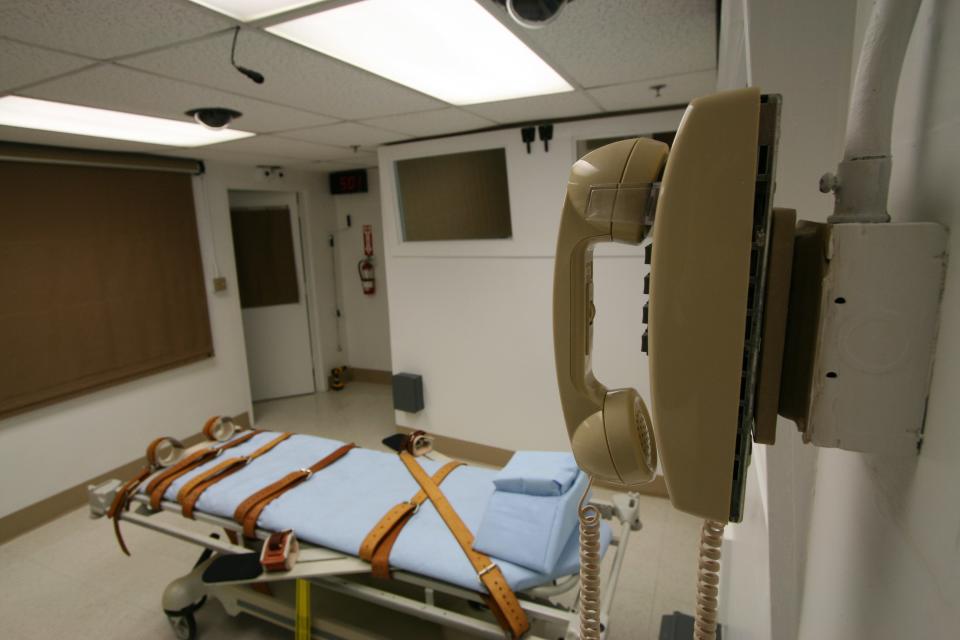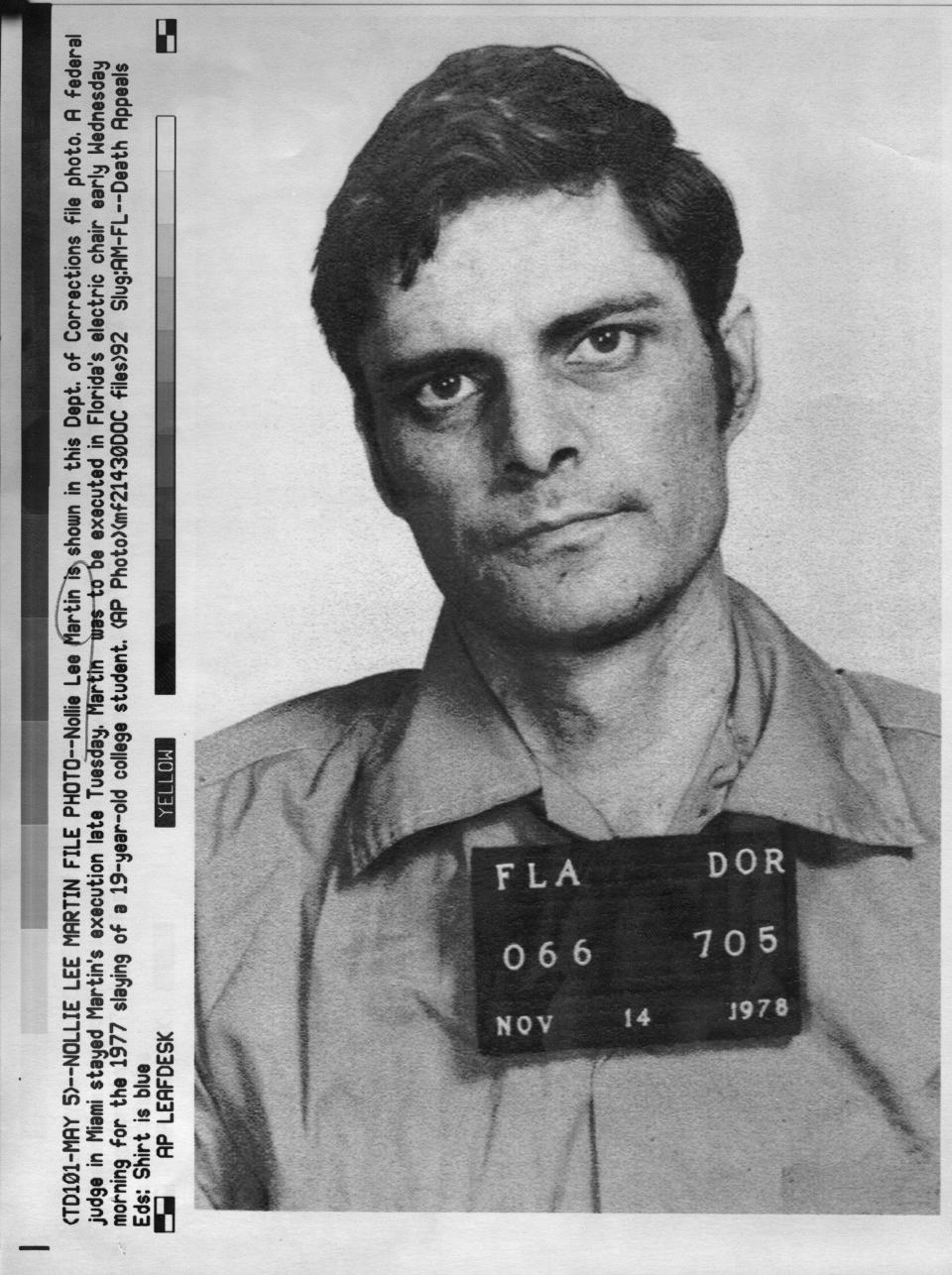Florida's lethal injection cocktail: 2 drugs for Duane Owen's execution are in short supply
Duane Owen, who in 1984 savagely slashed to death a 14-year-old babysitter and fatally bludgeoned a mother of two while children slept nearby, is facing his doom.
Gov. Ron DeSantis has signed the Palm Beach County killer's death warrant, and Owen's execution date is June 15.
Owen stabbed to death Karen Slattery, a Pope John Paul High freshman, and struck Georgianna Worden, 38, an executive secretary in an architectural firm and a mother of two, five times in the head with a hammer after breaking into the homes where they were.
Two of the drugs Florida will use to kill him are in short supply across the nation. The constant dearth of lethal injection drugs to replace expired supplies has many states scrambling to find them, substituting their usual cocktail with drugs such as fentanyl and even bringing back old execution methods, such as the firing squad, hanging and cyanide gas.
For subscribers: After witnessing execution of William Van Poyck, 'the world didn't seem safer. I was just numb'
Several years ago, pharmaceutical companies, especially those in Europe where opposition to the death penalty is widespread, began to learn that the drugs are ending lives, not saving them. Every European Union country opposes the death penalty, so they enacted export laws barring the drugs going to the United States for executions.
Big Pharma in the U.S. also isn't too pleased with the ethics or the possible damage to their reputations by supplying drugs to execute people. In 2016, Pfizer was the last big drug company to block its products from exacting the death penalty.
So what's an executioner to do?
Many states have gone clandestine — getting them from overseas manufacturers illicitly or going to some shady compounding pharmacies. Compounded drugs are not reviewed by the Food and Drug Administration for safety, effectiveness or quality.
So how is Florida stocking up? No way to know. The legislature made it secret in 2022.
What can go wrong in lethal injection executions?
When it comes to the rate of botched executions, lethal injections far outrank other methods, including hanging, according to Austin Sarat, an Amherst College professor of jurisprudence and author of "Botched Spectacles: Botched Executions and America's Death Penalty.
Most of the execution problems center on the sedatives. It's all about pain. The Eighth Amendment to the U.S. Constitution bars cruel and unusual punishment by the criminal justice system.
Many inmates have felt excruciating pain in botched, lengthy executions. The longest ever was three hours.
True Crime: Duane Owen murders babysitter Karen Slattery, 14, and woman, 38, as children slept
What are states resorting to for new execution methods?
About half of states employ the death penalty and almost all, as well as the federal government, use lethal injection as their primary method.
South Carolina offers the choice of the electric chair or the firing squad if lethal injection drugs can't be obtained. A Richland County judge, however, ruled last year that both secondary measures are cruel and unusual punishment. The governor has appealed.
In Florida, inmates also have a choice. They can die sitting on "Old Sparky," the electric chair, but only one inmate awaiting execution, Wayne Doty, has chosen it and he hasn't been executed yet. Besides, Old Sparky has had some issues in past executions, such as inmates' heads catching fire. That's why lethal injection became the primary method in 2000.
For subscribers: Column: I witnessed the executions of serial killer Aileen Wuornos. UF killer Danny Rolling
Some other states, including Arizona and California, have revived methods such as lethal cyanide gas.
New Hampshire, which abolished the death penalty in 2019 but can't apply it retroactively, has one inmate left on death row. Michael Addison was convicted in 2006 of killing Manchester police officer Michael Briggs.
Lethal injection was New Hampshire's primary method, but if it's "impractical," the state can hang him. No word yet on Addison's fate.
States with one- or two-drug methods tend to administer a lethal dose of a sedative, basically killing with an overdose of a painkiller. Nevada and Nebraska use fentanyl, the opioid killing tens of thousands of people overdosing in the U.S. each year.
How does lethal injection work in Florida? The 3-drug cocktail
Florida has a three-drug protocol when it executes by lethal injection. The first is an anesthetic to sedate. The second drug paralyzes the inmate and stops their breathing. The third, a concentrated form of potassium, stops the heart.
Even before the protocol begins, Florida offers inmates a dose of hydroxyzine, an antihistamine, to ease anxiety.
In step one, Florida uses the sedative, etomidate. The state introduced the use of this sedative in 2017, over the objections of manufacturer Johnson & Johnson. It has been in short supply since early May, according to ASHP, a association of 60,000 pharmaceutical professionals.
The drug is generally used to induce general anesthesia but can wear off in about 10 minutes, according to Darragh O'Carroll, M.D., an emergency doctor from Hawaii who has used it in surgery.
Any problem with poorly inserted IVs could be trouble. Florida requires two IVs be inserted ahead of the three drugs flowing. The execution team confirms that the inmate is unconscious before proceeding to the final two doses.
States have had trouble getting trained medical personnel to tap those veins. Medical workers aren't supposed to do harm. The American Medical Society has banned doctors from taking part in executions.
In Florida, the person on the execution team who purchases and maintains the drugs must be either a doctor or pharmacist. The state's secrecy law shields the identity of all team members.
More: Florida's death row: 305 people live there. Only 8 killed victims in Palm Beach County.

If the sedative wears off, the inmate can feel the devastating effects of the second drug, pancuronium bromide, which paralyzes the inmate and stops his breathing. Some of its injectable forms have been in short supply since late May, according to ASHP.
If the inmate feels the effects of this drug, it's like drowning or being suffocated. And because he's paralyzed, he can't tell anyone what's happening.
The final drug, a concentrated form of potassium called potassium chloride, stops the heart. It works within a minute, but it's excruciating without anesthesia. As it makes its way to the heart, it literally burns the veins carrying it in the bloodstream headed there. Though the other two drugs are usually given in lethal doses, they can take much more time, like 30 minutes, to kill.
Death row: How many Florida inmates are facing execution?

Florida's death row is host to 296 inmates, the second-largest number in the nation behind California, which has 663. Trailing is Texas, which has 184, and Alabama, with 167. Owen's would be the fourth execution carried out by Florida this year.
Eight inmates who reside on Florida's death row were sent there by Palm Beach County judges. Only two inmates from Palm Beach County cases have been executed since the death penalty was reinstated in 1976.
Nollie Lee Martin was executed in 1992 for the 1977 murder of 19-year-old George Washington University student Patricia Greenfield, while she worked at a summer job as a Delray Beach convenience store clerk. Martin stabbed her to death at the Lantana dump where he left her body.
William Van Poyk was executed in 2013 for the murder of 40-year-old Glades Correctional Institution guard Fred Griffis, a Vietnam War veteran, in a botched escape attempt as his fellow inmate was being delivered to a dermatologist in downtown West Palm Beach.
This article originally appeared on Palm Beach Post: Duane Owen Florida execution: Lethal injection drugs scarce

